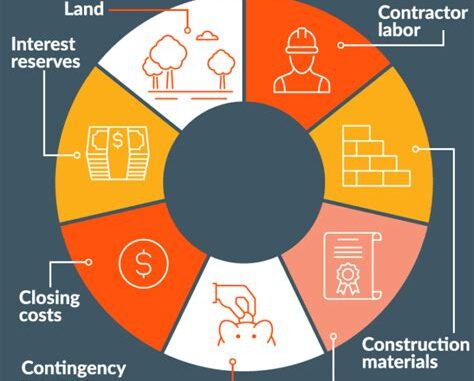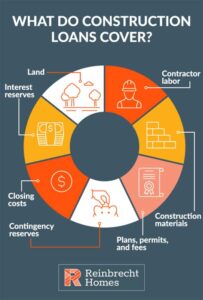
When it comes to financing your dream construction project, understanding the intricacies of closing costs and interest rates is essential. Closing costs can significantly influence the overall expense of a construction loan, impacting your budget and bottom line.
In this comprehensive guide, we will delve into the definition of closing costs specific to construction loans and explore the key factors that influence their associated interest rates. You’ll gain insights into how these costs affect your financial plans and what role lenders play in determining them.
Additionally, we’ll provide practical tips for reducing your closing costs, ensuring you can manage your finances effectively during the construction process. Whether you’re a first-time builder or a seasoned developer, this article equips you with the knowledge you need to make informed decisions and navigate the financial landscape of construction loans.
Defining Closing Costs In Construction Loans
Closing costs in construction loans refer to the various fees and expenses that borrowers must pay when finalizing a loan for construction projects. These costs are typically incurred during the closing process, which is the point at which the lender disburses the loan funds and the borrower takes ownership of the property. Understanding closing costs is crucial for borrowers as they can significantly impact the overall financing of a construction project.
Closing costs may include a variety of charges such as:
- Loan origination fees
- Appraisal costs
- Title insurance
- Inspection fees
- Recording fees
- Legal fees
- Prepaid costs, such as property taxes and homeowners insurance
Each of these components plays a role in the overall expenditure associated with obtaining a construction loan. By understanding closing costs, borrowers can better prepare their budgets and make informed decisions, potentially leading to significant savings.
Key Factors Influencing Construction Loan Interest Rates
When exploring the realm of construction loans, it’s crucial to understand how various factors can impact interest rates. These rates are not static; they fluctuate based on a variety of influences. Here are the key factors that play a pivotal role in determining construction loan interest rates:
- Market Conditions: The overall economic environment and the supply and demand for construction loans can significantly influence interest rates. When demand increases, rates may rise; conversely, during economic downturns, rates may decrease.
- Credit Score: Borrowers with higher credit scores typically qualify for lower interest rates. Lenders often view them as lower risk, and thus offer better terms.
- Loan Amount: The size of the construction loan can affect interest rates. Larger loans may come with slightly higher rates due to increased risk for lenders.
- Types of Loans: Different types of loans—such as fixed-rate, adjustable-rate, or interest-only loans—have different rate structures. Understanding these distinctions is essential when considering your financing options.
- Loan Term: The duration of the loan can also influence rates. Typically, longer loan terms may carry higher rates, while shorter terms might offer lower rates as they reduce lender risk.
- Down Payment: A larger down payment can lead to lower interest rates as it reduces the lender’s risk. Higher initial equity can indicate financial stability to lenders.
- Location: The geographic area where the construction will take place can impact rates. Areas with high demand for real estate may have higher rates, while less desirable locations may have lower rates.
- Debt-to-Income Ratio: A low debt-to-income ratio (DTI) can help secure a better rate. Lenders assess DTI to determine whether borrowers can manage additional debt.
By understanding closing costs and the factors influencing construction loan interest rates, borrowers can make more informed decisions when financing their projects. These insights also help in budgeting for the overall cost of construction, ensuring that financial planning is sound and sustainable.
Understanding Closing Costs: How They Affect Your Bottom Line
When embarking on a construction project, understanding Closing Costs is essential as they can significantly impact your overall budget and financial strategy. These costs are not merely additional fees but represent a crucial component that affects the total amount you will need to invest. Failing to consider them can lead to unexpected financial strain.

Closing costs typically include a variety of fees such as application fees, title insurance, and attorney fees, among others. It’s important to recognize that these costs can vary greatly depending on the lender, the location of the project, and the specifics of your loan agreement. Being aware of these variables helps you better prepare your financial plan.
One of the primary ways that understanding Closing Costs can affect your bottom line is through budgeting. When you have a clear grasp of these expenses, you can allocate your resources more effectively. This proactive approach not only helps you avoid urgent financial dilemmas but also enables you to focus on other critical aspects of your construction project.
Moreover, closing costs can influence the overall interest rates associated with your construction loan. Higher closing costs might lead to higher interest rates based on the lender’s policies, while negotiating lower costs can improve your rate and reduce the overall financial burden. Understanding this interplay gives you leverage in discussions with your lender, potentially resulting in more favorable terms.
Having a thorough understanding of Understanding Closing costs is vital for anyone looking to manage their finances effectively during a construction project. By recognizing how these costs affect your budget and financing options, you can make more informed decisions, ultimately safeguarding your investment and ensuring the successful completion of your project.
The Role Of Lenders In Determining Closing Costs
When it comes to understanding closing costs in construction loans, it’s essential to recognize the pivotal role that lenders play. Lenders not only provide the funds necessary to complete your construction project but also influence various fees and charges associated with the loan. Closing costs can vary widely depending on the lender, and understanding these differences is crucial for borrowers aiming to minimize their expenses.
One of the primary factors lenders consider when determining closing costs is the type of construction loan being offered. For instance, a lender may have different fee structures for traditional loans compared to more specialized products like FHA or VA construction loans. Additionally, the lender’s policies, local market conditions, and regulatory requirements can all impact the final closing costs.
Moreover, lenders may charge different amounts for services such as application fees, underwriting fees, and appraisal fees. Some lenders might offer no-closing-cost loans, which might appear appealing at first glance but often entail higher interest rates or added fees over the life of the loan. It’s important for borrowers to carefully evaluate these options when considering their financing.

Effective communication with your lender is essential to gain clarity on all fees associated with your construction loan. Ask for a detailed breakdown of closing costs and ensure to compare multiple lenders to identify the most competitive options available. By thoroughly understanding these factors, borrowers can make informed decisions that align with their financial goals and ultimately assist in understanding closing costs in construction loan interest rates.
Tips For Reducing Closing Costs On Construction Loans
When navigating the complex landscape of construction loans, understanding closing costs is essential for managing your financial commitment effectively. Here are some practical tips for reducing closing costs and saving money:
- Shop Around: Different lenders offer varying rates and closing costs. By comparing multiple lenders, you can find the most favorable terms and save significantly.
- Negotiate Fees: Don’t hesitate to ask lenders to waive or reduce certain fees. Many are willing to negotiate components like origination fees or appraisal costs.
- Consider a No-Closing-Cost Loan: While these loans typically come with a slightly higher interest rate, they can effectively minimize upfront costs, freeing up cash for other areas of your project.
- Limit Your Loan Amount: Borrowing only what you need can reduce the overall closing costs, as many fees are percentage-based. Assess your needs carefully to decrease your loan size.
- Use a Dedicated Local Appraiser: If possible, consider using a local appraiser. Local professionals can sometimes provide better rates, as they’re familiar with the area and its property values.
- Ensure Accurate Estimates: Keep track of your budget during the construction process. Overspending can lead to higher closing costs if additional financing is required.
- Leverage Government Programs: Look for government programs that may offer assistance with closing costs. Programs for first-time home buyers or specific construction loans can significantly lower costs.
- Plan Ahead: Give yourself ample time to prepare and shop for loans. Rushed decisions often lead to less favorable terms and higher costs.
By following these tips and keeping understanding closing costs at the forefront of your planning, you can effectively reduce expenses and achieve a more favorable financial outcome in your construction loan journey.

Frequently Asked Questions
What are closing costs in construction loans?
Closing costs in construction loans refer to the fees and expenses incurred during the closing of a mortgage loan, which can include lender fees, appraisal fees, title insurance, and other related costs.
How do construction loan interest rates differ from traditional mortgage rates?
Construction loan interest rates are typically higher than traditional mortgage rates due to the increased risk lenders take on during the construction phase, which includes the uncertainty of completion and the potential for cost overruns.
What factors influence closing costs for construction loans?
Closing costs for construction loans can be influenced by various factors such as the loan amount, the complexity of the construction project, local regulations, and lender fees.
Are closing costs negotiable in construction loans?
Yes, some components of closing costs may be negotiable, such as lender fees or service charges, but it depends on the lender’s policies and the competitiveness of the mortgage market.
Can closing costs be included in the construction loan amount?
In some cases, lenders may allow you to finance closing costs into the overall construction loan amount, which can help ease upfront financial burdens.
What should borrowers do to prepare for closing costs in construction loans?
Borrowers should budget for closing costs early in the planning process, obtain estimates from lenders, and factor these costs into their overall project budget to avoid surprises.
How can one minimize closing costs in a construction loan?
To minimize closing costs, borrowers should shop around for the best lenders, compare fee structures, consider negotiating fees, and explore options for waiving certain costs.

Leave a Reply